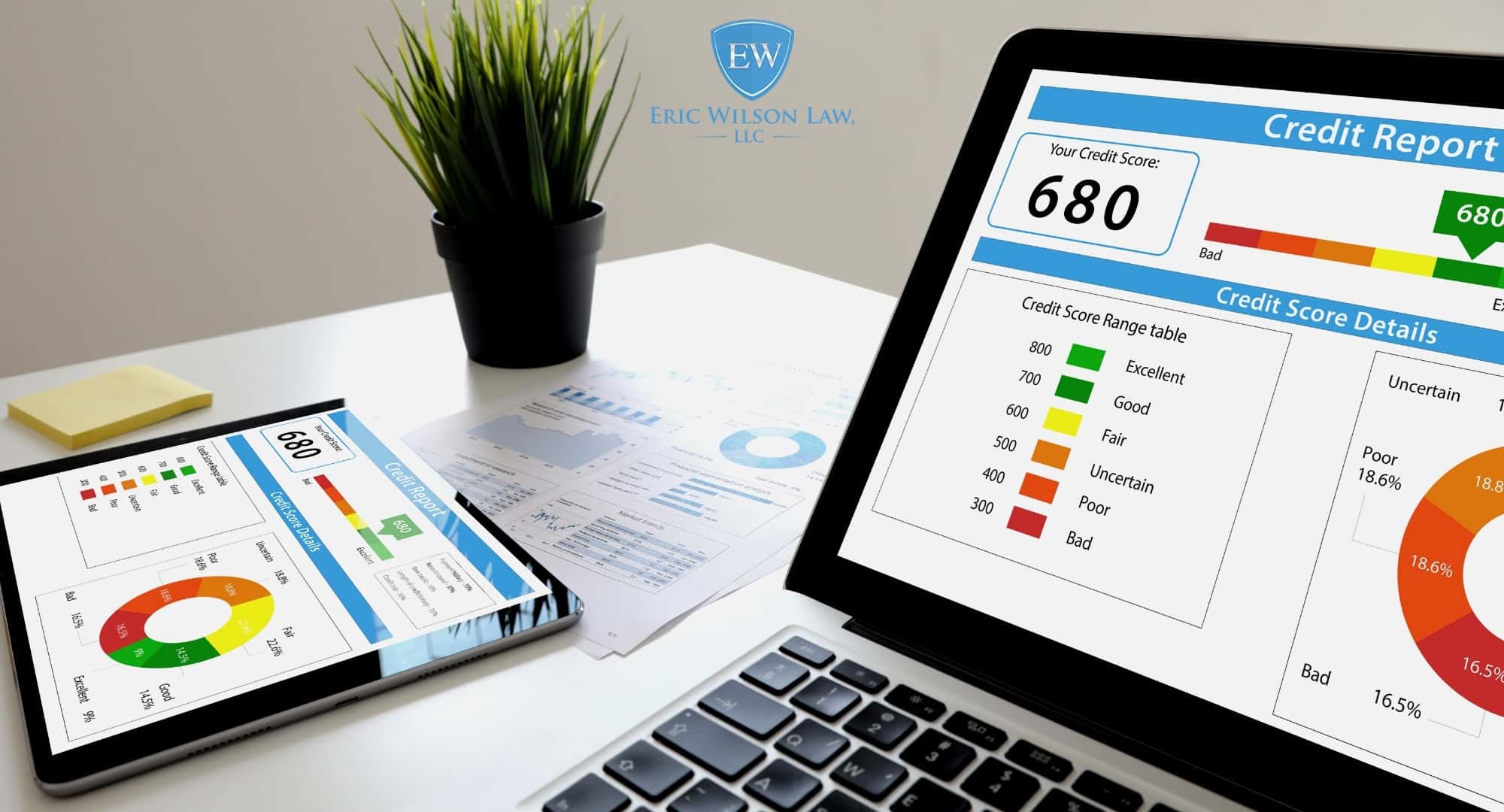Whether we like it or not, credit reports are a huge indicator of how financially healthy and responsible we are. Years of crippling debt can lead to years of late payments. Unfortunately, years of late payments can damage your credit score for up to seven years, making it difficult for you to receive necessary loans, buy or rent a house, or even get that job you want. Oftentimes, removing late payments from credit report is a huge part of the debt relief process. Luckily for you, the legal team at Eric Wilson Law LLC can help you do this and so much more on your journey to financial freedom. Call 205-349-1280 to schedule a free consultation with us.
When Do Late Payments Appear on Credit Reports?
Federal law mandates that payments can’t be reported as late to the main three credit bureaus until it’s at least 30 days past the due date. But some creditors don’t report late payments until they’re more than 60 days past the due date. If your bill is less than 30 days late, your credit score probably won’t suffer, but you may still have to deal with late fees. So as long as you pay your bills within that 30-day window, you shouldn’t see a late payment on your credit report.
How Do Late Payments Affect Your Credit Score?
Your credit report directly affects your credit score. Payment history makes up nearly your entire credit report. So one or more late payments on your credit report can certainly bring your credit score down. As a result, you may struggle to get an auto loan, buy a house, get a new credit card, and so much more. Some people who have a low credit score may even struggle to get a job. Basically, having a good credit score is the ticket to financial freedom and success. That’s why it’s so important to make on-time payments every single month.
Generally speaking, the higher your credit score is, the more points you have to lose from something like a late payment. For example, if your credit score is in the upper 700s, a single late or missed payment could make it drop by about 100 points. Meanwhile, if your score is somewhere in the 600s, a single late payment could make it drop by 50 to 80 points.
The good news is that your credit score can easily bounce back after a few months of timely payments. But if your report shows months or years of multiple late payments, credit repair will turn into an incredibly long, and sometimes hopeless, process.
Incorrect Late Payments on Your Credit Report
The credit reporting system isn’t perfect. Sometimes, people see inaccurate late payments on their credit history which really brings down their credit scores. A 2021 report claims that as many as 34% of Americans discovered at least one error – such as an incorrect late payment – on their credit report. Common credit report errors include:
- Identity errors such as the wrong name, number, or address. It’s also possible for incorrect accounts to appear due to identity theft.
- Incorrect account status reports such as closed accounts that are actually reported as open or duplicate debts.
- Data management errors such as information that appears again as incorrect when it was previously corrected.
- Balance errors such as accounts with an incorrect credit limit or accounts with an incorrect balance.
In order to prevent inaccurate information from appearing on your credit report, you should request a free credit report from all the credit bureaus every 6 months to 1 year. If you see a mistakenly reported late payment on your payment history, it’s crucial to dispute it and get that late payment removed as soon as possible to avoid any unnecessary financial woes.

How Long Do Late Payments Stay on Your Credit Report?
Just like a Chapter 7 or Chapter 13 bankruptcy filing, a late payment will stay on your credit report for up to seven years. Sometimes you can successfully remove late payments from your report, especially if it’s inaccurate information. But accurate negative information is far more difficult to remove from credit reports than inaccurate negative information.
How to Remove Late Payments from Your Credit Report
There are multiple ways to potentially get both inaccurate and accurate information removed from your credit report.
Goodwill Letter
The first way to potentially remove an accurate late payment from your credit history is to request a goodwill adjustment from your creditors. According to the Fair Credit Reporting Act (FCRA), creditors and credit bureaus must report accurate information about your personal finances. But creditors and credit bureaus also have the freedom to choose whether or not they want to report every single late payment. People can possibly take advantage of this freedom by requesting goodwill adjustments.
Basically, a goodwill adjustment is when a creditor chooses to have a late payment removed from your credit out of the pure goodwill of their heart. The best way to receive a goodwill adjustment is to write a goodwill letter explaining your financial situation to your creditor or credit bureau. It’s important to note that goodwill letters are only successful if you generally have a good, timely payment history. If your account history shows multiple payments that are late, this letter may not work in your favor.
You want to start off this letter by highlighting your history of on-time payments and your unproblematic relationship with your creditor. Then you should explain the exact details of why your payment was late. You can’t just invent a supernatural situation to excuse your late payment. Your creditor and credit bureau will likely want to see supporting documentation. So if you got into a nasty car accident that caused you to spend multiple days in the hospital and therefore miss your payment due date, include pictures and medical records to prove your story. Finish off the letter by explaining that this late payment was a one-time mistake and that you would like it removed from your credit.
Sometimes, creditors still won’t have mercy on you even if you explain and prove that an unforeseeable hardship led to your late payment. In that case, you could also offer to pay off a loan in exchange for removing late payments from your credit. Some creditors are more likely to grant your request when they receive something in return.
Pay for Delete Letter
Another way to potentially remove late payments from your credit is to submit a pay for delete letter. A pay for delete letter is also an option to remove a paid collections account from your credit.
Basically, a pay for delete letter offers to pay off a past-due debt in exchange for having late payments removed from your credit. In order to do this, write a letter to your creditor explaining your proposed pay for delete exchange. You could offer to pay off a debt partially or completely. But similar to a goodwill letter, creditors don’t have to grant or even respond to your pay-for-delete request.
A pay-for-delete request should be reserved as a last resort option because while it’s not technically illegal, it does fall into a sort of “grey area” of the Fair Credit Reporting Act (FCRA). Also, even if a creditor removes a late payment from your credit, it may not even boost your score all that much, especially if one or more credit accounts have been sent to collections. This is especially true if you use VantageScore or FICO credit scoring models. These models have actively excluded accounts in collections from credit scoring, and they have done so since 2013 and 2016.
Dispute Incorrect Late Payments
It is much easier to remove inaccurate late payments than accurate ones. That’s because, as previously stated, the Fair Credit Reporting Act requires creditors to report only accurate information on credit reports. If you notice any incorrect information, you have a right to write a dispute letter or undergo an online credit dispute process through the credit reporting agency site. In your letter, be sure to explain which late payment is inaccurate and why. It’s a good idea to include supporting documentation in this letter too.
In most cases, the credit reporting agency will correct your information quickly especially if they can easily verify that the information in question is, in fact, incorrect. Generally, the credit bureau has 30 days to investigate your claim and then another 30-45 days to actually respond to you about your claim. If the creditor can’t seem to verify late payment accuracy, they will still remove it from your credit history.
How to Avoid Late Payments on Your Credit Report
The best way to protect your credit score is to avoid late payments altogether. You can do that by:
- Setting up automatic payments every month. When you do this, a minimum payment will be pulled out of your bank account to ensure that your credit doesn’t suffer. If you want to pay more on a bill, you can easily go back and pay more.
- Putting all of your bill due dates in your phone calendar and set up reminders a few days in advance.
- Making more than one payment per month on your credit cards. This will protect your credit score in more ways than one. Firstly, by the time your due date rolls around, you’ll have already made a payment. Secondly, keeping a low credit card balance gradually improves credit utilization. Along with payment history, credit utilization also has a huge influence on your credit score.

Call a Tuscaloosa Bankruptcy Attorney at Eric Wilson Law Today
Eric Wilson Law LLC is a debt relief agency in Tuscaloosa, AL. Our legal team is passionate about providing paths to financial freedom and stability through bankruptcy, credit counseling, and so much more. We understand that debt relief is a rocky road that can temporarily bring down your credit score. So not only will we help you control your debt, but we’ll also help you fix your credit report. In order to schedule a free consultation with us, call 205-349-1280 today.


